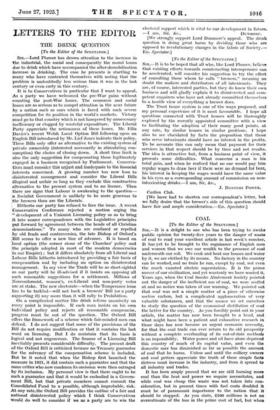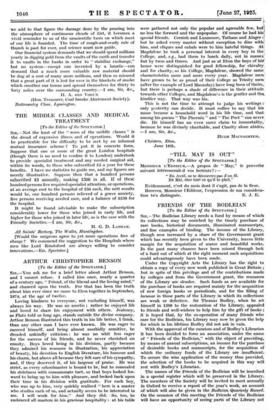COAL [To the Editor of the SPECTATOR.] SIR,—It is a
delight to one who has been trying to awake public opinion for twenty-five years to the danger of waste of coal to read your excellent article in last week's number. It has yet to be brought to the cognisance of English men and women that we owe our wealth to the presence of coal underneath our soil. We cook and heat our houses and water by it, we are clothed by its means. No factory in the country can be worked, and no train be run, except by coal, not even the much vaunted electric superstition. It is the prime mover of our civilization, and yet wantonly we have wasted it. Years ago, when the Coal Smoke Abatement Society pointed out the danger of the inefficient use of coal, we were scoffed at and no notice was taken of our warning. We pointed out that coal was not a simple matter of a piece of otherwise useless carbon, but a complicated agglomeration of very valuable substances, and that the sooner we set ourselves to study the question of the economical distillation of coal the better for the country. As you forcibly point out in your article, the matter has now been brought to a head, and what might have been a patient and exhaustive research in those days has now become an urgent economic necessity, for that the coal trade can ever return to its old prosperity without a complete overhauling of its out-of-date methods is an impossibility. Water power and oil have alone deprived this country of much of its capital value, and even the domestic user has diminished as far as possible the amount of coal that he burns. Unless and until the colliery owners and coal getters appreciate the truth of these simple facts distress must increase in the industry, and from it spread to all industry and trades.
It has been amply proved that we are still burning more coal than the heat and power we require necessitates, and while coal was cheap this waste was not taken into con• sideration, but in present times with fuel costs doubled it must be of paramount importance to the nation that it should be stopped. As you state, £100 millions is not an overestimate of the loss in the prime cost of fuel, but when
we add to that figure the damage done by the pouring into the atmosphere of continuous clouds of dirt, .it becomes a vivid reminder to us of the unscientific basis on which most of our life is founded. The time of rough-and-ready rule of thumb is past for ever, and science must now guide.
Our financial system demands that we should• spend millions yearly in diggirig gold from the vaults of the earth and transfer it to vaults in the banks in order to " stabilize exchange," but no system—except one invented by a lunatic—can demand that a much more valuable raw material should be dug at a cost of many more millions, and then so misused that a great part of it is lost for ever in the blankets of smoke which smother our towns and spread themselves for thirty to forty miles over the surrounding country.—I am, Sir, &c., H. A. DES VOEUX (Hon. Treasurer, Coal Smoke Abatement Society). Battramsley Close, Lymington.











































 Previous page
Previous page